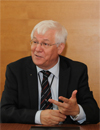 |
||
|
New START Treaty Unaffected by Disputes Over Ukraine - Russian Deputy FM RIA Novosti, PUBLISHED 12.05.2014 Russia and the United States continue to fulfill their nuclear disarmament obligations under the 2010 New START Treaty despite the chill in bilateral relations caused by the political crisis in Ukraine, a Russian deputy foreign minister told RIA Novosti Tuesday. “Both sides are implementing the 2010 START Treaty thoroughly and responsibly,” Sergei Ryabkov told RIA Novosti in an interview. “For now, there are no indications that the treaty will not be fully implemented [by the end of agreed seven-year duration period].” Russia and NATO formally agreed to cooperate over the European missile defense system at the 2010 NATO summit in Lisbon, but talks foundered, in part over Russian demands for legal guarantees that the system would not target its strategic nuclear deterrent. Topics: Ukraine Other news: Hungary Enacts Law to Expand Nuclear Power With Russian Aid Hungary’s president has signed a bill into law to expand a nuclear power plant in the country with Russian assistance. Hungary Lawmakers OK Russia Nuclear Plant Deal Russia will provide Hungary a loan of up to 10 billion euros ($13.5 billion) - around 80 percent of construction costs. Russia to Lend Hungary $13.7Bln for Nuclear Plant The deal was announced during a state visit to Moscow by Hungarian Prime Minister Viktor Orban and was hailed by Russian President Vladimir Putin. Last news:
|
Hero of the day 
We are currently working with the Nuclear Decommissioning Authority (NDA) on this approach, which was submitted in response to their February 2012 call for alternative proposals. We appreciate that the UK is in the early stages of their policy development activities and are pleased to be involved in such important work. INTERVIEW
Yanko Yanev OPINION
Joint Plan of Action |
Licence Р В Р’ВВВВВВВВВВВВВВР В Р’В» в„–Р¤РРРРРВРРвР ‚™Р’ Р Р†Р вЂљРІвЂћСћР В РІР‚™Р’ Р В Р’ Р вЂ Р В РІР‚љР’ Р В Р’ РІР‚љРІвЂћвЂ“77-30792. ATOMINFO™ trademark.

